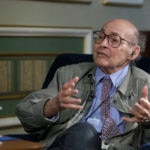Marvin Minsky, father of artificial intelligence, dies at 88
Marvin Minksy, regarded as the father of Artificial Intelligence (AI), has died at the age of 88 as a result of a brain hemorrhage. In 2014, Minsky was awarded the BBVA Foundation 'Frontiers of Knowledge' prize in Information and Communication Technologies. He was a professor emeritus at the prestigious Massachusetts Institute of Technology (MIT) in Boston and made significant contributions in the areas of mathematics, cognitive science, robotics and philosophy.

Minsky (New York, 1927) devoted his life to computers. A graduate in Mathematics from Harvard University, he saw in the brain a machine that could be replicated by computers. He was one of the first to refer to Artificial Intelligence and, along with another three scholars, turned it into a scientific discipline. He was convinced that computers could be provided with common sense and, in this way, humanize machines.
When he received the BBVA Foundation award, Minsky stressed the importance of creating more intelligent computers to be able to understand the brain function and how we learn to think and feel. He admitted that, since the 1940s, Artificial Intelligence had enabled the development of these machines, but that they were still incapable of learning the way humans do. He closed his speech by passing on the torch to a new generation and encouraged them to continue working in "basic long-term research”.
For us to consider normal what computers and smartphones are capable of doing today, there had to be someone who saw beyond a bulky and slow machine. And Minsky was one of them. He was “lucky”, as he himself once said, of being in the right place at the right time. First at Harvard, later and Princeton where he completed his postgraduate studies and had the change to rub shoulders with the world's best mathematicians, and finally at the MIT.

“In recent years I haven't seen anything that surprises me”
Minsky claimed that the greatest advances in Artificial Intelligence were achieved between the 1960s and the 1980s. “In recent years I haven't seen anything that surprises me”, he said a couple of years ago. He attributed this to the lack of resources in basic long-term research, which prevents new fields of study from being opened and leads to young researchers having to be satisfied with something “less imaginative than what they could have achieved”.
The mathematician has died convinced that computers will one day be as intelligent as human beings, because the great advantage of machines is their immortality. “One problem with people is that when one becomes very good in a certain skill, when that person dies, the skill is lost because we still have no explicit representation of how the human brain does complicated things.”
The life of Marvin Minsky in milestones
Minsky graduated in Mathematics from Harvard University in 1950. Nicolas Rashevsky's book, 'Mathematical Biophysics', awoke in him his interest in creating “thinking machines”. In his PhD thesis, which followed his postgraduate studies at Princeton University, he analyzed how neural networks capable of learning could be built. He developed his theories when computers were huge machines to which access was very restricted and which performed very few tasks.
In 1959, already regarded as the father of artificial intelligence, Marvin Minsky joined the MIT and together with his colleague McCarthy founded the Artificial Intelligence Laboratory. The term 'Artificial Intelligence' was first mentioned formally at Dartmouth College in 1956. John McCarthy, Allen Newell and Herbert Simon accompanied Minsky. The optimism that prevailed in those years around this new science was almost Utopian. Even so, the great problem that Minsky identified was the lack of “common sense” in computers. According to him, we are not aware of how wonderful our ability to learn by ourselves, guided by intuition, is.
Whoever claims that there are basic differences between the human mind and the machines of the future is wrong
But this mathematician's work was not limited to the field of AI. He also invented the confocal microscope (1955), a robotic arm (1967) or a small robot that draws when it moves and is connected to a computer (1972). The famous HAL 9000, which Stanley Kubrick recreated in the film '2001: A Space Odyssey', was Minsky's idea, as was the plot of ‘Jurassic Park’, by Michael Crichton (1990).
Thanks to publications such as 'The Society of Mind' (1987) or 'The Emotion Machine' (2006), among others, his legacy remains intact. According to him, better knowledge of how the brain works will enable us to build more intelligent machines, and these, in turn, will help us understand the brain better. The dilemma is whether we should create machines that are more intelligent than us. Minsky's answer to this question is: “Today, only one thing is certain: whoever says that there are basic differences between the human mind and the machines of the future is wrong”.